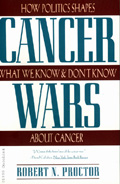Cancer Wars: How Politics Shapes What We Know & Don't Know About Cancer
encontrar mi
Author: Robert N. Proctor OncoLink Rating: |
Robert N. Proctor is a Professor of the History of Science at Pennsylvania State University. He states that "The purpose of this book is to explore the political history of cancer, focusing especially on recent debates over its cause." The author feels that government and industry are largely responsible for the fact that "...the war against cancer is being lost."
The book is divided into ten chapters, followed by a conclusion. The first chapter begins by describing early conceptions of trends, explaining that the concern over the increase in cancer incidence dates back to the mid-nineteenth century. Many other issues are then covered. A chapter is devoted to environmental affects on cancer rates. Another chapter is dedicated to what the author calls "The Reagan Effect," referring to the slashing of budgets of agencies such as the Occupational Safety and Health Administration. Chapter five argues that certain influential establishments (for example, the Tobacco Institute) mislead the public about cancer facts, and often work to conceal evidence.
Also discussed are the current debates over natural carcinogens found in the plants we eat, and the validity of animal studies. Another chapter looks at the history of radiation cancer, using the high incidence of lung cancer in workers from the uranium mines that lie between Germany and Czechoslovakia as an example. An entire chapter is dedicated to the hazards of radon. The author uses this as an example of how government and industry interests affect what the public knows about everyday hazards. The last chapter discusses the history of the idea of genetic predisposition toward cancer.
Each of these chapters is very well organized, and easy to read. Each chapter begins with a pertinent quote; the quote that heralds the conclusion summarizes the feelings of this book. It is a quote by Samuel Epstein (1978): "While much is known about the science of cancer, its prevention depends largely, if not exclusively, on political action." The author feels that government and industry lead the public to believe that the high incidence of cancer is due to lack of knowledge about it. He proposes that the truth is that we know a sufficient amount to begin taking steps toward prevention of cancer, but that government and industry are unwilling to do so if it is not in their best interest. He states that "Knowledge about cancer is not in very short supply. What is needed are thoughtful and confident steps to reorient cancer policy."
This book is very well written and researched, and is very easy to read. The author puts forth many interesting ideas. He also provides notes for each chapter, a bibliography and an index. The major drawback, however, is that this book represents only one side of an issue. It would certainly benefit the reader to investigate further about the many advances made daily in cancer research, which is largely funded (not hindered) by government.

